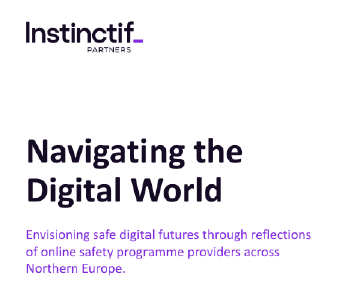Google and Media Literacy Ireland shine a light on Digital Literacy in Northern Europe
by Ryan Meade, Public Policy & Government Affairs Manager, Google Ireland
In an increasingly connected world, where children and young people spend a significant portion of their time online, building digital literacy skills is paramount. On October 8th, 2024, Google and Media Literacy Ireland joined forces to host a webinar on digital literacy, marking the launch of the “Navigating the Digital World” research report. The event brought together practitioners, academics, and civil society organisations from across Northern Europe to share insights and discuss the complex challenges of online safety for children and parents.
The “Navigating the Digital World” research by Instinctif Partners, commissioned by Google, recently concluded with the release of a comprehensive report. The research aimed to understand the work of various organizations across Northern Europe dedicated to online safety programs for young people. It involved in-depth interviews and document reviews from ten different organisations in five countries including: A Lust for Life (Ireland), Barnardos (Ireland), Child Focus (Belgium), Bureau Jeudg & Media (The Netherlands), Early Learning Initiative, NCI (Ireland), Media Literacy Ireland, Mobile Stories (Sweden), Parentzone (UK), Protect Children (Finland), and Webwise (Ireland).
These organisations play a crucial role in equipping the younger generation with the necessary tools to navigate the digital landscape responsibly.
The report highlights the significant progress these organisations have made in promoting online safety and digital literacy. It also identifies common challenges, such as infrastructural issues (capacity, funding), parental confidence, and parent-child disconnects. Key recommendations for parents and policymakers focus on normalising online safety discussions and increasing collaboration between stakeholders.
The research emphasises the importance of equipping young people with the necessary tools to navigate the digital landscape safely and responsibly. We hope it will be a valuable resource for organizations, policymakers, and funders working to create a safer online environment for children and young people.
Key themes in the case studies
Parental confidence
The research underscores the critical role parents play in ensuring online safety for children and young people. While organisations provide valuable resources, parents often lack confidence in their digital literacy skills. Rapid technological advancements can leave them feeling overwhelmed. Bridging the knowledge gap requires tailored approaches that accommodate busy schedules and address their specific needs.
Expansion
Over half of the organisations that took part in the case studies said that they hoped to expand their programmes in the future. The organisations interviewed noted their plans to make their programmes more accessible, particularly for children with special educational needs and expand them to cover more age groups. This is especially relevant as children continue to get access to devices and the online world at a younger age and need to develop online safety skills.
Adaptability
The organisations have focused on creating programmes that are adaptable, practical and relevant to young people. Feedback from young people has been essential to allow them to do this. The Be Internet Legends material has proven adaptable to a variety of programmes and contexts and can be easily embedded into programmes or updated with information to make it relevant to local trends/developments.
The research was launched at an online roundtable co-hosted by Google and Media Literacy Ireland to facilitate an open discussion among participants and to invite expert guest speakers to share their findings and exchange lessons learnt. The session sparked a lively discussion among participants, who explored topics such as:
● Bridging the generation gap in media literacy
● Engaging parents in digital literacy education
● Integrating media literacy into school curricula
● Developing a Europe-wide approach to digital literacy
A key theme that emerged was the overwhelming amount of information available to parents, coupled with a lack of clear, actionable guidance. Participants agreed on the need to build trust between generations and create strong support networks to help children navigate the digital world safely.
Key takeaways from the webinar’s expert speakers included:
● Emer Sugrue (Instinctif Partners) highlighted findings from the report, emphasizing common challenges faced by organizations working to improve digital literacy. These include infrastructural issues like funding and capacity, as well as a lack of parental confidence and communication between parents and children. Instinctif’s recommendations focused on normalizing conversations about online safety.
● Paula Aalto (Mannerheim League for Child Welfare) shared insights from Finland’s successful media education initiatives, which prioritize practical, hands-on learning for parents and children. Aalto stressed the need to tailor digital literacy education to different age groups and compared learning these skills to “learning how to ride a bicycle.”
● Andreas Lieberoth (Aarhus University, Denmark) explored Denmark’s approach to digital literacy, noting the challenges parents face in finding reliable information and the lack of empirical evidence in public debates about screen time. He also highlighted the importance of local governance in shaping digital policies in Denmark.
Overall, the event highlighted the importance of collaboration and knowledge-sharing in addressing the shared challenges of digital literacy across European countries. By working together, we can empower both parents and children to navigate the online world with confidence and safety.
